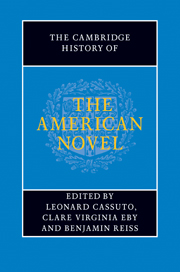Book contents
- Frontmatter
- General Introduction
- PART ONE INVENTING THE AMERICAN NOVEL
- Introduction: inventing the American novel
- 1 Transatlantic currents and the invention of the American novel
- 2 Susanna Rowson, Hannah Webster Foster, and the seduction novel in the early US
- 3 Charles Brockden Brown and the novels of the early republic
- 4 The novel in the antebellum book market
- 5 American land, American landscape, American novels
- 6 Cooper and the idea of the Indian
- 7 The nineteenth-century historical novel
- 8 Hawthorne and the aesthetics of American romance
- 9 Melville and the novel of the sea
- 10 Religion and the nineteenth-century American novel
- 11 Manhood and the early American novel
- 12 Sentimentalism
- 13 Supernatural novels
- 14 Imagining the South
- 15 Stowe, race, and the antebellum American novel
- 16 The early African American novel
- PART TWO REALISM, PROTEST, ACCOMMODATION
- PART THREE MODERNISM AND BEYOND
- PART FOUR CONTEMPORARY FORMATIONS
- A selected bibliography
- Index
11 - Manhood and the early American novel
from PART ONE - INVENTING THE AMERICAN NOVEL
Published online by Cambridge University Press: 28 July 2011
- Frontmatter
- General Introduction
- PART ONE INVENTING THE AMERICAN NOVEL
- Introduction: inventing the American novel
- 1 Transatlantic currents and the invention of the American novel
- 2 Susanna Rowson, Hannah Webster Foster, and the seduction novel in the early US
- 3 Charles Brockden Brown and the novels of the early republic
- 4 The novel in the antebellum book market
- 5 American land, American landscape, American novels
- 6 Cooper and the idea of the Indian
- 7 The nineteenth-century historical novel
- 8 Hawthorne and the aesthetics of American romance
- 9 Melville and the novel of the sea
- 10 Religion and the nineteenth-century American novel
- 11 Manhood and the early American novel
- 12 Sentimentalism
- 13 Supernatural novels
- 14 Imagining the South
- 15 Stowe, race, and the antebellum American novel
- 16 The early African American novel
- PART TWO REALISM, PROTEST, ACCOMMODATION
- PART THREE MODERNISM AND BEYOND
- PART FOUR CONTEMPORARY FORMATIONS
- A selected bibliography
- Index
Summary
In the decades between the American Revolution and the Civil War, both the concept of manhood and the genre of the novel underwent important transformations. With changes in the economy, the political system, and family structure, the relatively secure patriarchal paradigms of colonial manhood were becoming noticeably threadbare. A new fiction ofmasculinity – spreading forth from the nascent white middle class in the urban northeast–gradually revised all major relations by which manhood is defined. The new paradigm of “self-made manhood” changed how men saw themselves in relation to their fathers (and thus their understanding of paternal authority), to women (and the emergent ideal of domestic womanhood), and to their peers (and, more broadly, the homosocial public sphere). These changes, pitting a new concept of manly self-regard against traditional social bonds, resulted in tensions and ambiguities sometimes described by historians of antebellum manhood in terms of a “crisis.”
During the same decades, the novel arose from the status of a morally questionable genre at the end of the eighteenth century to that of the most popular literary form by the middle of the nineteenth. Early critics of the novel found in the genre, ironically, both the danger of solipsism and the threat of risky social affiliations. The novel was criticized for luring its readers into a privatist, isolated existence, and for fostering in them alternative identifications and imaginary bonds that threatened to erode existing structures of power. The “triumph of the novel” did not end such concerns. While, by the 1850s, the legitimacy of the novel as such was seldom questioned, its relative linguistic freedom, open form, and mounting diversification kept debates over its moral hazards alive.
- Type
- Chapter
- Information
- The Cambridge History of the American Novel , pp. 192 - 208Publisher: Cambridge University PressPrint publication year: 2011



